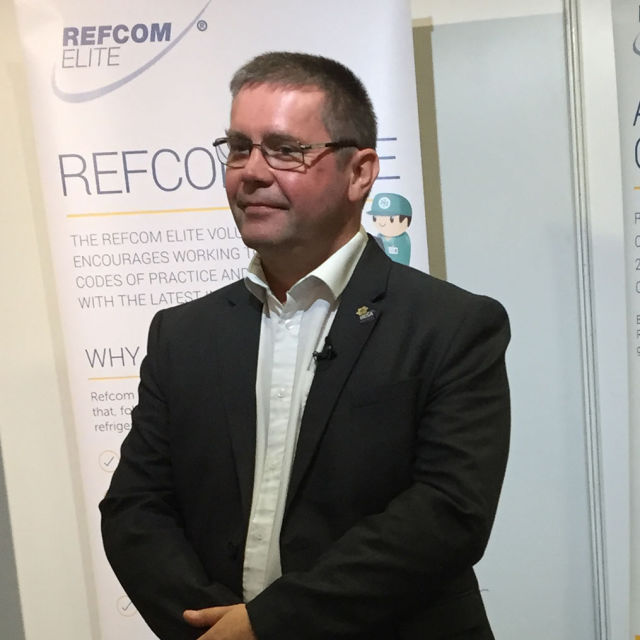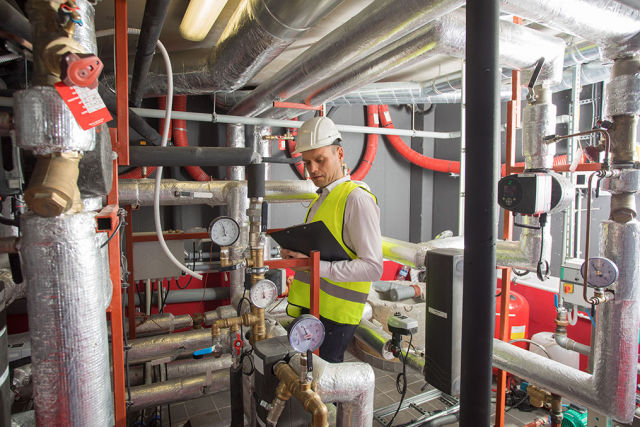Refcom helps raise profile of ‘invisible sector’

The UK’s primary F Gas register Refcom played a key role in the first World Refrigeration Day (WRD) as co-host with the Institute of Refrigeration (IoR) and the United Nations Environment Programme (UNEP).
Head of Refcom Graeme Fox kicked off events in Europe with a presentation from the East of England Showground* that was transmitted around the world and followed events broadcast from Australia, New Zealand, the Middle East and China before the baton was handed on to Africa, the US and Canada.
WRD was launched to raise the profile of the refrigeration, air conditioning and heat pump sectors, which the organisers said remained largely invisible to the public despite its pivotal role in making modern life possible.
“Our industry is a hidden miracle,” Fox told his global audience, pointing out its pivotal role in food storage and transportation; healthcare, the development and dissemination of medicines; and IT and data management.
“Without cooling you would just have to throw away your smart phones because they wouldn’t work,” he said. “Even the international space station uses ammonia cooling and our technologies will be essential to achieving carbon reduction targets.”
BESA chief executive David Frise said it was a “massively underestimated industry” that was responsible for making parts of the world habitable.
“In the next 10 years, there will be more air conditioning units installed than in the whole history of the industry since 1902. This is a massive sector that is not going away and the challenge now is to make it more environmentally friendly and energy efficient,” he said.
Held on the 195th anniversary of the birth of refrigeration pioneer Lord Kelvin (June 26), the theme was #WREFD19 Diversity – diversity of applications, people, careers, locations, technology, science, engineered solutions, and innovation.
Many of the worldwide events placed particular emphasis on skills and encouraging young people to consider careers in an industry that already employs more than 50,000 people in the UK.
Fox said many people did not even realise there were careers available in the sector and called for more focus on schools and careers’ advisors. “This is a fantastic industry with a wealth of opportunities for anyone looking to learn a useful trade and contribute to society,” he said.
The IoR delivered a series of presentations promoting careers in the industry and showcased its popular ‘Fantastic Fridges’ website, which provides valuable educational resources for teachers and pupils. Chief executive Miriam Rodway chaired a series of debates and said the organisation would be working closely with STEM Ambassadors to promote the profession in schools and colleges.
It also launched its ‘Cool for School’ competition for children aged between 11 and 14, who are encouraged to submit videos of them carrying out refrigeration-based science experiments. The winning school will receive £2,000 worth of science kits with two runners up receiving resources worth £1,000.

WRD also showcased the launch of the first ‘Train The Trainer’ sessions for the pilot programme of the Refrigerant Driver’s Licence (RDL), which is an initiative championed by Mr Fox. He and his Refcom team had been lobbying for some time for training and standards aimed at helping countries, who signed up to the Kigali Amendment, to prepare for working with more environmentally friendly, but flammable, refrigerants.
“The RDL is a vital and significant development for the worldwide refrigerant industry and is in line with Refcom’s ambition to help raise professional standards both at home and abroad,” said Fox. “There are many countries without the training and technical infrastructure we take for granted, but who still want to progress and adopt more environmentally friendly refrigerants. This Refcom-led initiative is a great way for us to share our expertise around the world and collaborate with other countries for the greater good.”
The wide network covered by the industry was captured in a WRD presentation by the chief executive of the Cold Chain Federation Shane Brennan. He said that frozen food sales rose by more than 4% last year, but that the world wasted more than a third of all the food it produced.
“We are trying to perform a climate balancing act by reducing post-harvest food losses while also cutting CO2 emissions from transport,” he said. “This is at a time when the global economy and population are growing, which means we will need significantly more cooling – from 3.5 billion cooling units today to 9.5bn by 2050.”
This huge increase in cooling capacity could also drive a trebling of energy use from 3.6 terra-watt hours (TwH) in 2018 to 9.5 TwH by 2050 and a potential doubling in CO2 emissions, according to Mr Brennan.
In order to make the whole process more energy efficient would require greater use of smart technologies, including digitisation and artificial intelligence, along with improved awareness among the general public, better management of data and tougher regulation, he explained.
ASHRAE president Darryl Boyce said his organisation had been carrying out refrigeration research for almost 125 years and wanted to work with “partnering organisations to celebrate the important contributions that refrigeration makes toward our daily well-being around the world”.
He said ASHRAE was working with the UNEP OzonAction programme to produce a ‘Refrigerants for Life’ pocket guide, posters and stickers.
FETA chief executive Russell Beattie put the wider role of the sector into context with a series of ‘fun facts’ including
- In 1948 just 2% of UK homes had a fridge – by 1970 that had risen to 58%
- There are 1.4 billion fridges in us worldwide – 335 million in Europe
- The first experiments in refrigeration were carried out by Scottish inventor William Cullen in 1755
- Refrigeration uses 10% of the world’s electricity, but modern fridges are 75% more efficient than those used in the 1970s
- Refrigeration technology will increasingly be used for heating as many more heat pumps are being installed and they operate by reversing the refrigeration cycle
- The largest refrigerator in the world is the Large Hadron Collider located under Switzerland and France that is being used to research the nature of matter and the origins of the universe.
*The WRD seminars were broadcast from the 2019 Temperature Controlled Storage and Distribution Exhibition.







